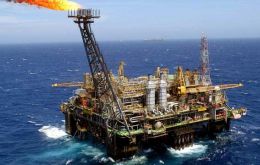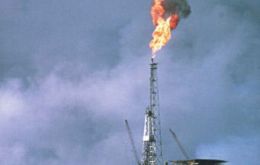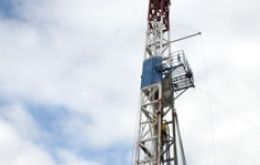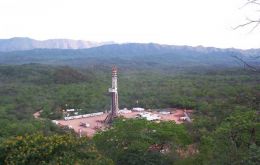MercoPress. South Atlantic News Agency
Energy & Oil
-
Monday, January 26th 2009 - 20:00 UTC
Petrobras/Repsol strike gas in Santos basin shallow waters

The Consortium formed by Brazil's government managed oil and gas corporation Petrobras and Spain's Repsol announced the discovery of a “thick column of natural gas” in the offshore Santos basin, southeast of Brazil.
-
Thursday, January 22nd 2009 - 20:00 UTC
Exxon finds evidence of oil in Brazil's pre-salt basin

Exxon Mobil Corp., Hess Corp. and Petrobras found evidence of oil at an offshore block in Brazil's Santos Basin in an area close to the largest oil discovery in three decades in the American continent.
-
Thursday, January 22nd 2009 - 20:00 UTC
Argentina's crude output down for seventh year running

Argentina's oil production fell for the seventh consecutive year in 2008, declining 1.8% to 230 million barrels, according to a report from an economic consulting firm cited Wednesday in the Buenos Aires press.
-
Thursday, January 22nd 2009 - 20:00 UTC
Petrobras averaged 2.4 million bpd output during 2008

Brazilian government managed energy giant Petrobras produced an average of 2.4 million barrels per day of crude and natural gas at its operations inside and outside Brazil in 2008, an increase of 4.3%, or roughly 100,000 barrels of oil equivalent per day, compared to 2007.
-
Monday, January 19th 2009 - 20:00 UTC
Venezuela supports OPEC production cuts of 2 to 4m bpd

Venezuela is ready to sponsor a new cut in crude production to protect the oil market, two to four million barrels per day, confirmed Rafael Ramirez, Energy Minister and President of Petroleos de Venezuela (PDVSA), the country's government owned oil corporation.
-
Saturday, January 17th 2009 - 20:00 UTC
Spain's Repsol announces oil discovery offshore Brazil

Spanish oil company Repsol anounced this week the discovery of “traces” of hydrocarbons at a deepwater well being drilled off the Brazilian coast. In an official statement Repsol said the well was completed in Block BM-S-48, located in the Santos Basin off the coast of the south-eastern state of Sao Paulo.
-
Friday, January 16th 2009 - 20:00 UTC
World oil demand forecasted to continue contracting

While oil prices ended this week's trading in the range of 35 US dollars the barrel, the International Energy Agency (IEA) has cut its estimates on world oil demand and for the first time since 1982-1983, expects two consecutive years of contracting demand for crude oil.
-
Thursday, January 15th 2009 - 20:00 UTC
Dr. Colin Phipps, a visionary of the Falklands oil future

Dr Colin Phipps, long linked to the Falkland Islands and one of the driving forces behind the promising frontier oil industry passed away in London on January 10.
-
Thursday, January 15th 2009 - 20:00 UTC
Chile-Peru consortium to invest in natural gas plant

A Chilean-Peruvian consortium plans to invest 650 million USD in a project to produce ammonium and ammonium nitrate from natural gas, Peruvian President Alan Garcia said Wednesday.
-
Wednesday, January 14th 2009 - 20:00 UTC
To comply with OPEC, Ecuador cuts private oil output

The Ecuadorian government has decided to suspend oil production by Italy's Agip and France's Perenco, both of which operate in the Amazon region, to comply with new OPEC cuts.
